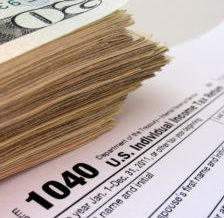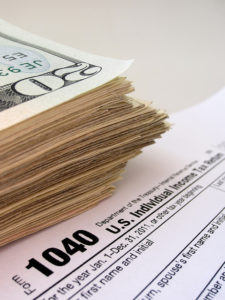As a freelancer, you’re the boss—at tax time, too. If you earn more than $600 from
independent work in a year, you’re officially in business as far as the IRS is concerned.
With the help of Austin’s Parkhurst Consulting*, we’ve compiled a few helpful reminders for staying on top of your taxes as a freelancer, whether you’re brand-new to running your own show or have been freelancing for years.
Self-Employment Tax and Quarterly Payments
Now that you work for yourself, you have to pay the full portion of federal Social Security and Medicare taxes, which is 15.3 percent of your income. You don’t have to start paying this self-employment tax until you are profitable—that is, when your earnings exceed what you’ve invested in your business. Since many of us work from home and have low overhead costs, we are profitable almost immediately.
If this is the case, the self-employment tax is typically paid on a quarterly basis, by the 15th of April, June, September, and January. The amount of quarterly tax you owe is calculated when you file your previous year’s tax return and is essentially an estimate based on projected income.
Sales Tax and Business Personal Property Tax
Texas does not have a state income tax, but it does collect a sales tax. There are many business activities that are exempt from sales tax, but some freelancers may provide services which require it. This can get complicated very quickly, so you should check with an accountant or the Texas Comptroller of Public Accounts to determine whether your services or products are required to include sales tax. If so, the sales tax here is 8.25 percent, so be sure to factor that amount into your final quote. You can apply for a sales tax permit online at the Comptroller’s website.
Business personal property taxes also apply. Any assets like computers and furniture need to be reported to your county on an annual business personal property rendition form. For more information contact the Travis County Appraisal District.
Deductions
There are many expenses you can write off without worrying that the IRS will knock on your door in the middle of the night. For starters, 50 percent of the self-employment tax is deductible.
Other business-related items you can deduct include: office supplies; website design and management; professional dues; travel and lodging expenses; auto mileage reimbursement (57.5 cents per mile, but you do have to keep thorough records of miles traveled in a mileage log); professional development training fees; licenses; etc. You should also keep track of all meals and entertainment associated with your business, but only 50 percent of those expenses can be deducted.
Don’t forget your home office. To qualify for the home office deduction, a space must be used regularly for business only. It must also be on your property. If you rent your home that’s fine, but a space in someone else’s building won’t qualify (so coworking doesn’t count—although you can still deduct the cost under business expenses). The home office deduction also does not apply if you have negative income.
To calculate, you can generally take what the square footage is of your actual working space (such as your office, or where your desk is in a room) and factor the percentage of the space based on the total square footage of the home. From there, you can also deduct percentages of your phone bill, cable bill, Internet, etc. There is also an IRS safe harbor of up to $1,500/year if you don’t want to calculate all your home office deductions. If there’s any chance your expenses go beyond that, though, it’s worth keeping track.
Capital expenses, such as your computer or desk, can also be deducted up to the amount of the expenditure, your taxable income, or $500,000, whichever is the least. There are certain limitations on what you can deduct based on the taxable income of the business and the amount of expenses involved. Certain types of depreciation can be taken, even if you have no taxable income prior to that deduction. This can be complicated, so you’ll need to check with your accountant.
Paperwork
Keep your business expenses separate from personal. Combining expenses on a business account is a huge red flag for the IRS because it complicates the business accounting. Setting up a separate business account or using a business credit card simplifies the process. Make sure you can easily document your deductions with printed receipts and/or online account statements. Investing in an accounting software like QuickBooks or FreshBooks is really worth it.
Being organized also means staying on top of your clients to make sure you get the paperwork you need from them on time. This includes:
- any W2s for yourself or your spouse
- 1099s from any contract labor
- charitable contribution documentation
- mortgage interest statements, if you own a home
- property taxes paid
- K1 for any investments.
If you’ve hired any subcontractors, you must also provide a 1099 to those individuals by January 31st. Keep track of your paperwork, or you run the risk of having to file for an extension.
Tying the Knot
The good news is you found the love of your life. The bad news is your partner’s income may affect your tax bracket and how much you owe. If you and your spouse have similar incomes, there may be advantages to filing separately. However, if one spouse’s income is vastly greater than the other’s, it’s typically in your best interest to file jointly. There are many factors that help a couple make this decision (medical expenses, insurance, tax debt, etc.), so it’s best to have an accountant review your situation each year.
Retirement
As a freelancer, you have many options for retirement plans. The best option in terms of taxes is a SEPIRA, which allows you to deduct about 20 percent of your taxable business income if you’re a schedule C, or 25 percent of your wages paid if you’re a corporation. There are virtually no setup costs to that plan, and no form to file with the IRS.
Health Insurance
Under Obamacare you are legally required to purchase health insurance or otherwise pay a penalty at tax time. Freelancers who are not insured through a spouse can buy insurance plans online from federal and state marketplaces. Self-employed individuals can receive tax credits if they use these marketplaces. To receive a tax credit, you must meet a minimum income threshold. Visit this IRS page for more info.
Hiring Professional Help
You can afford to file your own taxes without professional advice if you rent, don’t have any investments, and have just a W2 at the end of the year. Otherwise, personally and without bias, we feel that there really isn’t a time a freelancer, who is technically a business owner, should be without professional financial assistance. Tax professionals can help you mitigate the ever-changing tax code and decrease your tax liability over time, so it’s very likely you’ll receive the value of a professional’s fees in tax savings, not to mention the time you save by not trying to figure it all out yourself.
Further Reading
US Small Business Administration
*Full disclosure: I’m a client of Parkhurst Consulting. They came highly recommended by a small business owner who had a bad experience with a previous accountant and screened a dozen local candidates before selecting them. They also very generously donated their time to contributing to this article.
- Freelance Taxes 101: Everything You Need to Know for Tax Time - December 4, 2015
- 6 Common Freelance Fears That Could Be Holding You Back - October 30, 2015
- The Tao of Freelancing - October 12, 2015


